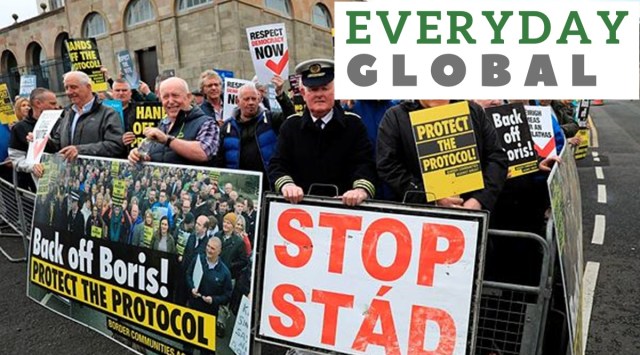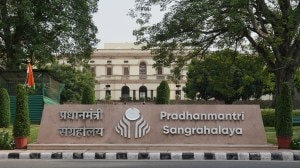- India
- International
Explained: The ‘Northern Ireland Protocol’ standoff between the EU and the UK
What has the UK done that made the EU sue it, and why is Northern Ireland at the centre of this controversy? The Indian Express explains.
 Demonstrators protest outside Hillsborough Castle, ahead of a visit by British Prime Minister Boris Johnson, in Hillsborough, Northern Ireland, May, 16, 2022. (File, AP)
Demonstrators protest outside Hillsborough Castle, ahead of a visit by British Prime Minister Boris Johnson, in Hillsborough, Northern Ireland, May, 16, 2022. (File, AP)The European Commission has launched two new legal proceedings against Britain and re-opened another, after the latter proposed a legislation which seeks to get it out of some of its Brexit obligations. Britain’s government claims the the Northern Ireland Protocol Bill is only meant to maintain “stable social and political conditions in Northern Ireland.”
European Commission Vice President Maros Sefcovic, who is the European Union’s (EU) Brexit Commissioner, on Wednesday said in a news conference that there was no justification for unilaterally changing an international agreement. “Let’s call a spade a spade. This is illegal,” Reuters quoted him as saying.
If pushed through, these legal proceeding could mean the European Court of Justice fining Britain.
What has the UK done that made the EU sue it, and why is Northern Ireland at the centre of this controversy? The Indian Express explains.
What is Britain’s new law?
Put very simply, the new legislation, yet to be tabled in Parliament, seeks to reduce customs checks and paperwork for trade between Great Britain (England, Scotland and Wales) and Northern Ireland (which together with Great Britain forms the United Kingdom).

Britain’s Prime Minister Boris Johnson has said the changes it will introduce are “relatively trivial”. However, these changes violate a key part of the painfully negotiated 2019 Brexit deal – the Northern Ireland Protocol.
The Northern Ireland Protocol
After the UK left the European Union, Northern Ireland remained its only constituent that shared a land border with an EU-member, the Republic of Ireland. EU and UK having different product standards, checks would be necessary before goods could move from Northern Ireland to Ireland.
However, the two sides have had a long history of conflict, with a hard-fought peace secured only in 1998 under the Belfast Agreement, also called the Good Friday agreement. Fiddling with this border was thus considered too dangerous, and it was decided the checks would be conducted between Northern Ireland and Great Britain. This was called the Northern Ireland Protocol.
Under the protocol, Northern Ireland remains in the EU single market, and trade-and-customs inspections of goods coming from Great Britain take place at its ports along the Irish Sea.
Why UK now wants to violate the Protocol
The Northern Ireland Protocol Bill was unveiled on June 13. The UK government has admitted it violates international law, unilaterally doing away with provisions of the Brexit deal. However, it has justified itself using the “doctrine of necessity”, claiming that breaking this law was its only way to serve crucial domestic interests.
The government website says, “The doctrine of necessity provides a clear basis in international law to justify the non-performance of international obligations under certain exceptional and limited conditions.”
The domestic interests it wants to safeguard are both economic and political.
The checks have made trade between Great Britain and Northern Ireland cumbersome, with food products, specially, losing out on shelf life while they wait for clearance. Some taxation and spending policies of the UK government can’t be implemented in Northern Ireland because of EU rules.
Also, any kind of border in the Irish Sea irks those who want a united United Kingdom. Significantly, one such person is Sir Jeffrey Donaldson, leader of Democratic Unionist Party (DUP) of Northern Ireland. Northern Ireland went to polls in May, and since then, the DUP has paralysed Stormont, its Parliament.
The DUP refuses to allow a government to be formed until the trade border is softened. If the impasse lasts for six months, fresh elections will have to be called.
What measures does the new Bill propose?
The bill’s main proposals are that a ‘green lane’ with fewer clearances be created for goods that will remain in Northern Ireland, while a more stringent ‘red lane’ looks at goods destined for the EU; spending and tax policies for Northern Ireland be decided only by London; and disputes be resolved not through the European Court of Justice, but through independent arbitration and negotiations.
It also proposes that businesses in Northern Ireland be allowed to choose between UK or EU standards.
Opposition to the Bill
The Bill has been criticised both within and outside the UK, and is likely to face a tough journey in Parliament whenever it is tabled. However, the UK government has kept negotiations going with the EU to soften the Northern Ireland Protocol, so the Bill may never be needed.
Experts have pointed out that the Bill effectively means the UK dishonouring a treaty it signed and is bad for the country’s reputation. Also, with its economy already in trouble, the UK can ill-afford a trade war or even fines from the EU.
In Northern Ireland, a majority of the members of its Assembly have opposed the Bill, as it is likely to bring in more uncertainty for them.
What the EU has said
As reported by Reuters, the two new suits accuse Britain of failing to ensure adequate staff and infrastructure to carry out checks in Northern Ireland and not providing the EU with sufficient trade data.
The other, paused a year ago to improve the atmosphere around talks, is about the movement of agri-food products.
Sefcovic has said the EU might take the case to the ECJ if Britain failed to address the EU’s charges within two months.
However, Sefcovic also said the EU still wants to continue talks with Britain to soften the Protocol. “We decided that our response should be measured, should be proportionate. And we are offering not only legal action here today but we’ve been fleshing out what concretely we could do,” he said.
More Explained
EXPRESS OPINION
Apr 19: Latest News
- 01
- 02
- 03
- 04
- 05








































